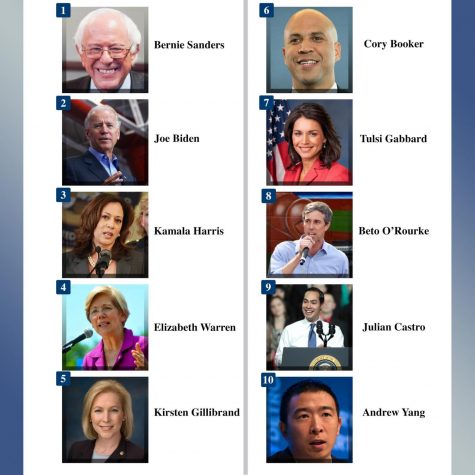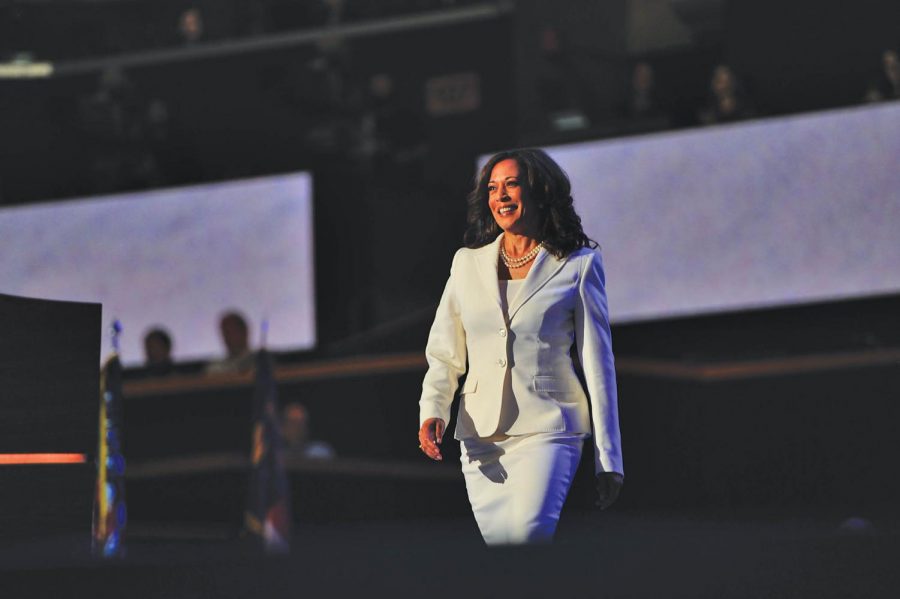Improved Democratic presidential candidate rankings sees Sanders as front runner
Harris announced her campaign as a presidential candidate on Jan. 27.

Now that the 2018 midterms are behind us, many Democrats are beginning to announce their candidacy for president. CNN recently put out an updated power ranking of these candidates, which is just inaccurate and awful. It doesn’t seem to have any core measurements which allow them to consistently rank candidates. It’s also unclear whether they’re ranking candidates based on how much they like them, or by how likely it is for them to get votes in 2020. If you’re going to rank presidential candidates you have to use some sort of empirical data, otherwise you’re just shaping public opinion under the guise of giving your reader factual information. While the following ranking certainly has some opinion involved, I’ve made sure to justify each of my rankings so that you as the reader are able to understand my perspective, and why I believe a democratic voter will agree.
For this article to improve upon CNN’s shortcomings, my ranking will be based on the perceived share of the vote they will receive. To determine their rank, the criteria I used were as follows: how well candidates and their individual policy platforms are polling, the style of their campaign (populist or establishment), amount of media coverage (positive and negative) and how they stand out among competitors.
Here is how my ranking turned out:
- Andrew Yang – As a relative outsider and entrepreneur, Yang is unlikely to garner much media attention. Although, he does make the list because he is running on a platform centered around establishing a Universal Basic Income (UBI) which, as of February 2018, 65 percent of Democrats supported. (CNN Ranking: Not Ranked)
- Julian Castro – With little national recognition and no radical policy proposals, it’s unlikely that Castro will stand out among his competitors. He’s included on this list because the mainstream press will likely give him a decent amount of coverage because he’s a centrist with an ideology in line with the political establishment. As a former member of the Obama administration it’s likely he’ll end up on at least the first debate stage. (CNN Ranking: 10)
- Beto O’Rourke – After getting a lot of national press during the 2018 Texas Senate race, O’Rourke has the name recognition to be on this list. In terms of the national policies which he would implement, it’s unlikely that he’ll stand out. He has an Obama-esque cadence when he speaks, and he used a lot of grassroots momentum to propel him in the Senate race. It’s still unknown whether he will run or not, but while O’Rourke was a great candidate in comparison to Ted Cruz, he doesn’t match up very well against other 2020 contenders. (CNN Ranking: 2)
- Tulsi Gabbard – As a strong anti-war candidate, Gabbard is likely to catch the attention of those who are very tired of “interventionist regime change war” as she calls it. She’s unlikely to get much positive mainstream press as she’s been criticised for travelling to Syria and meeting with President Bashar al-Assad. She also has connection to Hindu nationalists such as India’s Prime Minister Narendra Modi. She’s also been accused of having an anti-gay past, but she’s apologized multiple times and has stated that her views have changed. She currently has a 100 percent rating from the Human Rights Campaign which is the main organization which rates elected official’s Pro-LGBT voting record. (CNN Ranking: Not Ranked)
- Cory Booker – As a charismatic and well spoken politician, Booker gets a lot of love from mainstream press. Policy wise, their are a variety of reasons Democratic voters will be hesitant to cast their votes for him. He’s pro-charter school, has consistently voted in line with big-pharma and has close ties to big names on Wall Street and in Silicon Valley. (CNN Ranking: 5)
- Kirsten Gillibrand – With a solid voting record when it came to legislation following the 2008 financial crisis, and a recent supporter of Medicare for All, Gillibrand has a decent argument to be made for a liberal voting record. She has supported some more questionable things as well. She supported an anti-BDS (Boycott, Divestment and Sanctions) bill. BDS is a proposal to crack down on Israel’s human right abuses against Palestinians. Anti-BDS bills typically target individuals and companies who participate in or support a boycott of Israel and says that the U.S. will not buy anything from those companies anymore. Gillibrand has since back tracked on her support of the bill, but she says she would still support a slightly different version of an Anti-BDS bill than the one she supported. She also voted to give retroactive immunity to telecommunications companies that participated in warrantless surveillance under the Bush administration. (CNN Ranking: 8)
- Elizabeth Warren – As a candidate that is strong on corporate greed, Warren has a great record of fighting against banks, corporations and individuals who use their fortune to defraud the American people. She favors a wealth redistribution to the poor. She created the Consumer Financial Protection Bureau, which helps investigate fraudulent practices by financial institutions and returns money to defrauded Americans. Her well thought out economic policy will certainly catch people’s attention, but when Bernie Sanders jumps into the race, it’s unlikely that she’ll stand out as much, especially when Sanders is likely to support most, if not all, of her ideas. (CNN Rank: 4)
- Kamala Harris – With a CNN town hall already under her belt, it’s clear that Harris has large mainstream media support. If she won the presidency, she would be the first black female president in American history which has been a big talking point of the press. While she does support Medicare for All, her record as Attorney General in California is terrible. She refused to prosecute now Treasury Secretary Steven Mnuchin. In the wake of the 2008 financial crisis, her office found over a thousand instances of misconduct by Mnuchin’s One West Bank, and stated that further investigation could uncover thousands more. Yet, her office decided against further investigation. Additionally, during her tenure as attorney general, Harris claims not to have been aware of the fact that attorneys in her office argued in court that the state of California could not release prisoners early because prisons would lose an important labor pool. Prisoners in California are paid anywhere from eight cents to 37 cents an hour. Under her supervision, attorneys essentially argued that California was dependent on a modern institution of coerced labor. In 2012, the Los Angeles Times reported that an innocent man whose conviction was thrown out by a federal appellate court in 2010 was still in prison two years later because Harris’ office had appealed the case arguing “he did not file his legal paperwork seeking release on time.” These are just a few of many examples of her record that will eventually prevent her from the democratic nomination. (CNN Ranking: 1)
- Joe Biden – The former Vice President is consistently topping 2020 primary polls with an average of 33 percent of likely voters. This, as well as his core support from mainstream media outlets, puts him toward the top of this list. I can guarantee he will not win the nomination though because his policies are awful. At a May 2018 Brookings Institute Event, he defended billionaires arguing that they’re just as patriotic as working people. Biden also said that Paul Ryan was right to go after Social Security and Medicare when working on tax reform. He’s a centrist in a time when people are really looking for some major change. Once he’s compared to other candidates, it’s unlikely he’ll garner much support. (CNN Ranking: 3)
- Bernie Sanders – With absolutely no name recognition at the beginning of his 2016 presidential campaign and a fair bit of foul play from the DNC, Sanders overcame all odds and garnered 43% of the popular vote in the democratic primaries. Now, Sanders is one of the most popular politicians in America. According to an October 2018 Gallup Poll, 53 percent of Americans view him favorably. Broken down by party, 78 percent of Democrats, 54 percent of Independents and 26 percent of Republicans view him favorably. Democrats overwhelmingly support the core of his policy platform which includes Medicare for all, free college, a living wage, getting the money out of politics and taxing the wealthy their fair share. Sanders has been very consistent with his beliefs. Videos going back to 1985 which show Sanders discussing the same issues he does today. Additionally, Sanders has a long history of protecting the rights of LGBT people and African Americans being active in both movements for equality. Overall, he is an example of the kind of politician many Democratic Party voters are looking for, and will pose a serious threat to President Trump in the general election.
(CNN Rank: 7)







